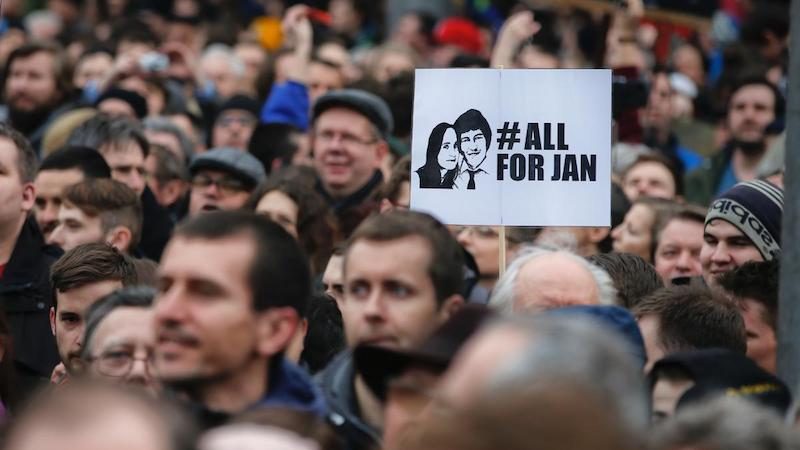Saturday 5 May, was supposed to be a special day for murdered Slovak journalist Jan Kuciak and his fiancée Martina Kušnírová. It was the day they chose to get married. Instead Slovakia is still coming to terms with their murder. A cold blooded murder that interrupted Jan and Martina’s young lives, killing their dreams and aspirations.
People met on the eve of the planned wedding in more than 20 towns and cities in Slovakia and abroad. In Bratislava 25,000 people participated in the event to honour the memory of Jan and Martina.
Protesters held up signs with slogans such as “We want an election” and “Imprison (former Prime Minister) Fico” as they called for new elections and the protection of journalists and media freedom.
In fresh threats to press freedom, several editors and journalists have either resigned or have been dismissed by RTVS – the Slovak National Radio and Television services.
A case in point is the disciplinary warning given to editor and presenter Zuzana Kovačič Hanzelová.
“Today, Zuzana Kovačič Hanzelová received a disciplinary punishment for her Friday position about normalisation,” wrote Matúš Dávid, one of the sacked RTVS journalists, on social media.
“She allegedly lied and did not tell the truth. In the next six months, she can be sacked for even a slight violation of work discipline – like being late 10 minutes to work,” he explained.
The alleged lies are related to a status posted on 27 April on a social network. She declared that chief editor Vahram Chuguryan pushed through a story for a live broadcast about Syrian children using effervescent pills to fake foam so they looked like they had experienced a chemical attack.
Chuguryan, the former Slovak education ministry spokesperson, recently prohibited reporters from wearing badges that showed solidarity with the murdered couple.
More than 200 reporters from Slovak media outlets have signed an open letter in which they expressed their concern on the current situation at RTVS. “Those trying to silence the media are first and foremost meddling with the right of the public to know what is happening in the country,” said the letter.
The letter was signed by reporters, journalists and editors from Slovakia’s main media houses, including Sme, Denník N, Korzár, Hospodárske Noviny, the Trend, Týždeň, Aktuality.sk, Euractiv.sk, SITA newswire, and the private broadcaster JOJ.
Slovak President Andrej Kiska expressed his concern, and in a Facebook post he said “Free and independent media are an important and inevitable condition for democracy.”
They added that “silencing journalists and replacing them with obedient propaganda is the first step towards introducing dictatorships and totalitarian regimes.”
This didn’t prevent former Prime Minister Robert Fico, from launching a new attack on civil society activists, the independent media, the opposition and Kiska. Addressing his party’s national congress on Thursday, Fico said that the demonstrations’ organisers, Kiska and the media were attacking the constitutional bodies.
Weekly protests forced Fico’s government to resign in March but the new government retains most of the members of the previous administration, with Fico’a close ally Peter Pellegrini now leading the country. Analysts believe Fico is still calling the shots from behind the scenes as he remains chairman of the governing Smer-SD party.
“We aren’t going away,” Fico said, adding “we’ll mobilise and we won’t be intimidated. We’ll fight for pushing our social views through. We won’t allow any amateurs with their naive economic notions to endanger the social standing of the public. We’re ready with our social policies to fight again for life and decent prospects for Slovak people.”
Slovakia dropped 10 places in the 2018 World Press Freedom Index which highlights Fico’s statements that journalists are “filthy, anti-Slovak prostitutes” and “idiotic hyenas”, as one of the examples of politicians’ hostility towards the media.
More worryingly the governing party has introduced new amendments to its statute which has reduced the party executive from 35 members to 15 members. Political scientist Grigorij Mesežnikov described the move as “oligarchisation”.
“A smaller number of people will decide how narrow the space for other opinions will be,” he said, as cited by the Sme daily.












